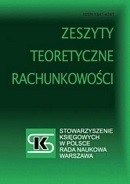Metody wyceny rozchodu zapasów z perspektywy normatywnej i pozytywnej teorii rachunkowości – przypadek PKN Orlen
Inventory costing from the perspective of normative and positive theory of accounting – the case of PKN Orlen
Author(s): Karol Marek Klimczak, Ewelina ZarzyckaSubject(s): Economy
Published by: Stowarzyszenie Księgowych w Polsce
Summary/Abstract: Inventory costing is of major interest to accounting research because it affects financial performance and liquidity of manufacturing companies. The debate on alternative methods seemed to be finished until the IASB and the FASB announced their project to create a common accounting standard. Controversy arose because IAS 2 forbids the use of LIFO, while that methods is popular in the USA, also for tax accounting. In Poland there was no debate concerning inventory costing at the time of IFRS endorsement, even though the Polish Accounting Act permits the use of LIFO (art. 34, section 4) both for reporting and tax accounting. However, even in Poland companies make choices in this regard, as the case of PKN Orlen shows. This company presents financial performance calculated using weighted average cost method in the financial statements, but in presentations for analysts it uses LIFO. The case is analysed from the perspective of accounting theory and empirical studies, including a new study on the effects of financial reporting by PKN Orlen on the stock market.
Journal: Zeszyty Teoretyczne Rachunkowości
- Issue Year: 2011
- Issue No: 64
- Page Range: 163-178
- Page Count: 15
- Language: Polish

